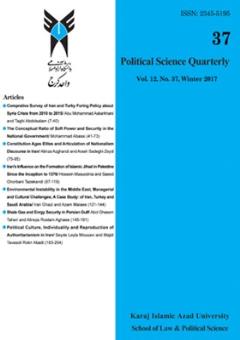The effects of international sanctions on the transfer of technologies to Iran in the oil industry; Challenges and solutions
Subject Areas :manohgar arbab 1 , hasan shamsini ghiasvand 2 , Asadollah Athary Mariyan 3
1 - Political Science. Student period Ph.D. in Political Science. Iran issues. Zahidan
2 - Assistant Professor of Political Science-Faculty of Law and Political Science. Vineyard. Qazvin Iran
3 - Department of Political Science, Takestan Branch, Islamic Azad University, Takestan, Iran: Corresponding Author. Atahary.asadollah@yahoo.com
Keywords: Sanctions, technology, technology transfer, oil industry.,
Abstract :
One of the behavior patterns of governments with each other, especially with hostile governments, is the use of embargo behavior, which, of course, is also considered in the United Nations Charter. One of these sanctions is to prevent the sanctioned country from achieving technology and industrial progress. The main question of this research is what short-term and long-term effects international oil sanctions have had on the transfer of technologies to Iran in the oil industry between 2010 and 2020. In order to explain this issue by using the descriptive-analytical method, it can be said that the pressure on Iran's oil revenues and its impact on severe financial restrictions, putting pressure on foreign investment, preventing the entry of new technologies and the forced exit of international companies, as well as inefficient management Especially in the years 2010 to 2020, it has caused the deterioration of technologies in all sectors, including the oil industry. Also, international sanctions have had direct effects on the transfer of technologies to Iran in the oil industry, and in addition to the natural decrease in oil production and its sale in the world markets, foreign investment in this field has also faced challenges. Of course, the Iranian government has reduced part of the negative effects of sanctions by supporting domestic elites and technological and knowledge-based companies related to oil industry technologies.
-اخلاقی، بهروز؛ بیابانگرد، حسین (1379) فناوری و جایگاه آن در سرمایهگذاری خارجی، فصلنامه مدرس، دوره4، شماره4.
-جاوید، احسان (1393) مشروعیت اعمال تحریم های اقتصادی یکجانبه در حقوق بین الملل؛ ضامن اجرای حقوق بین الملل یا ابزار سیاست ملی؟ فصلنامه حقوق و سیاست، شماره 22، 105-150.
-چانگ، ها-جون (1393) اقتصاد سیاسی سیاست صنعتی، مترجم: اصلان قودجانی، تهران: نوین طراحان آزاد.
-خلیلی، محسن ؛ صلواتی، فاطمه (١٣٩٣). گستردهسازي و استمرار تحریمها علیه ایران بنیان زیر نظري سازوکار تحریم/توازن در ساختار نظام بینالمللی، مطالعات اقتصادي سیاسی بینالملل، 1(1) 121-140.
-شریف، محمدنواز (1367) مدیریت انتقال تکنولوژی و توسعه، ترجمه رشید اصلانی، تهران: وزارت برنامه و بودجه، مرکز مدارك اقتصادی اجتماعی.
-صیادی، محمد؛ برکشلی، فیدون (1391). اثرات کوتاه مدت و بلندمدت تحریم های بین المللی نفتی بر بخش انرژی ایران. مجله گزارش راهبردی، شماره 155، مرکز تحقیقات استراتژیک.
-عالمي، حمزه (1398)، صنعت نفت ايران بعد از تحريم، تهران: بصيرت.
-محمدی، عباس (1391). تکنولوژی و معضل انتقال تکنولوزی، مجله اطلاعات سیاسی اقتصادی، 165.
-معظمي، منصور؛ سرعتي آشتياني، نرجس (1391) راهبردهاي مقابله با اثرات تحريم بر صنعت نفت ايران با تأکيد بر توسعه همکاریهای دانشگاه و صنعت، فصلنامه نوآوری و ارزش آفرینی، دوره 1، شماره 1
-منظور، داود و منوچهر مصطفیپور (١٣٩٢). بازخوانی تحریمهاي ناعادلانه، ویژگیها، اهداف و اقدامات، فصلنامه سیاستهاي مالی و اقتصادي، ویژهنامه کارنامه اقتصادي دولت، 1 (٢)
-موسایی، علی (1383). جهانی شدن و تکنولوژی در صنعت نفت، همايش ملي توسعه فناوري در صنعت نفت.
-نژادحسینیان، محمدهادی (1383). فرصت ها و چالش های الحاق ایران به پیمان منشور انرژی، مجله اقتصاد انرژی، 58. 20-21
-نوری، وحید؛ هانتر، شیرین (1400) جنگ مالی: تحریمهای مالی ایالات متحده علیه ایران، تهران: نگارستان اندیشه.
-یاری، احسان؛ رضایی، دانش؛ غامی، محمدحسن. (1397). گونهشناسی تحریمهای بینالمللی اعمالشده علیه جمهوری اسامی ایران (١٣٩٥-١٣٥٨). فصلنامه مجلس و راهبرد، 26(99)، 61-96.


